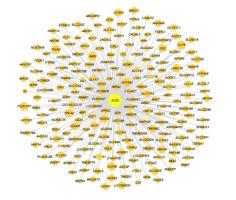Computational and Structural Biotechnology Journal ( IF 4.4 ) Pub Date : 2020-09-02 , DOI: 10.1016/j.csbj.2020.08.024 Zhilan Zhang 1, 2, 3 , Lin Li 1, 2, 3 , Mengyuan Li 1, 2, 3 , Xiaosheng Wang 1, 2, 3

|
The severe acute respiratory syndrome coronavirus 2 (SARS-CoV-2) has infected more than 13 million people and has caused more than 570,000 deaths worldwide as of July 14, 2020. The SARS-CoV-2 human cell receptor ACE2 has recently received extensive attention for its role in SARS-CoV-2 infection. Many studies have also explored the association between ACE2 and cancer. However, a systemic investigation into associations between ACE2 and oncogenic pathways, tumor progression, and clinical outcomes in pan-cancer remains lacking. Using cancer genomics datasets from the Cancer Genome Atlas (TCGA) program, we performed computational analyses of associations between ACE2 expression and antitumor immunity, immunotherapy response, oncogenic pathways, tumor progression phenotypes, and clinical outcomes in 13 cancer cohorts. We found that ACE2 upregulation was associated with increased antitumor immune signatures and PD-L1 expression, and favorable anti-PD-1/PD-L1/CTLA-4 immunotherapy response. ACE2 expression levels inversely correlated with the activity of cell cycle, mismatch repair, TGF-β, Wnt, VEGF, and Notch signaling pathways. Moreover, ACE2 expression levels had significant inverse correlations with tumor proliferation, stemness, and epithelial-mesenchymal transition. ACE2 upregulation was associated with favorable survival in pan-cancer and in multiple individual cancer types. These results suggest that ACE2 is a potential protective factor for cancer progression. Our data may provide potential clinical implications for treating cancer patients infected with SARS-CoV-2.
中文翻译:

SARS-CoV-2宿主细胞受体ACE2与免疫治疗反应呈正相关,并且是癌症进展的潜在保护因子。
截至2020年7月14日,严重的急性呼吸系统综合症冠状病毒2(SARS-CoV-2)已感染超过1300万人,并在世界范围内造成超过570,000例死亡。SARS-CoV-2人类细胞受体ACE2最近受到广泛接受因其在SARS-CoV-2感染中的作用而受到关注。许多研究还探讨了ACE2与癌症之间的关系。然而,仍然缺乏对ACE2与致癌途径,肿瘤进展和全癌临床结果之间关联的系统研究。使用来自癌症基因组图谱(TCGA)程序的癌症基因组数据集,我们对ACE2之间的关联进行了计算分析表达和抗肿瘤免疫力,免疫治疗反应,致癌途径,肿瘤进展表型和13个癌症队列的临床结果。我们发现ACE2上调与增加的抗肿瘤免疫信号和PD-L1表达,以及有利的抗PD-1 / PD-L1 / CTLA-4免疫治疗反应有关。ACE2表达水平与细胞周期,错配修复,TGF-β,Wnt,VEGF和Notch信号通路的活性呈负相关。此外,ACE2的表达水平与肿瘤的增殖,干性和上皮间质转化有显着的负相关。ACE2上调与泛癌和多种个体癌症的良好生存相关。这些结果表明ACE2是癌症进展的潜在保护因素。我们的数据可能为治疗感染SARS-CoV-2的癌症患者提供潜在的临床意义。











































 京公网安备 11010802027423号
京公网安备 11010802027423号